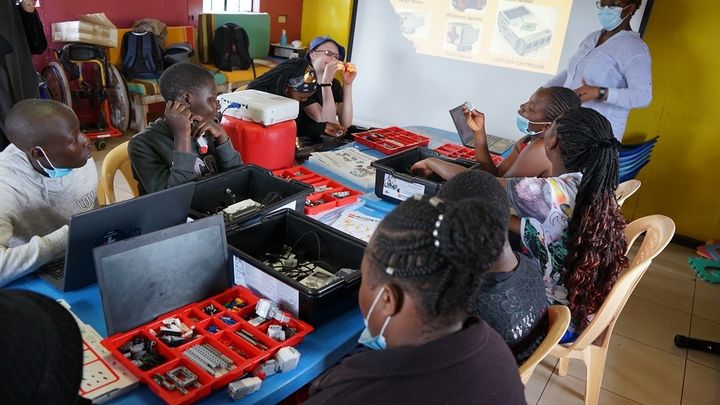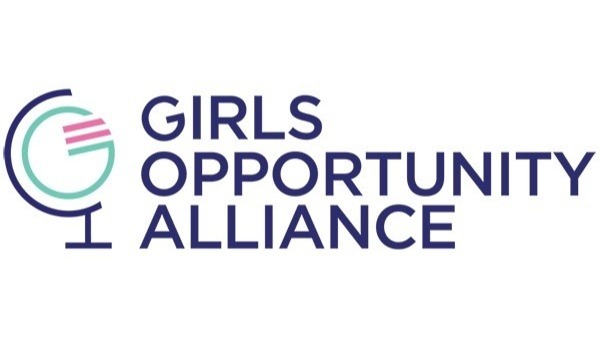
The Action Foundation Kenya
Donation protected
Empowering Girls with Disabilities in Kenya through STEM Education & Mentorship
Please help The Action Foundation raise $50,000 to support STEM Education & Mentorship for 400 Girls with Disabilities from Underserved Communities in Coastal Kenya
Who is the Action Foundation?
The Action Foundation (TAF), is an internationally recognized, community-driven organization working with communities, organizations, local and international bodies to end exclusion, discrimination and violence against children, women and girls with disabilities in underserved areas in Kenya.

What is this project all about?
Our project aims to establish a STEM Centre of Excellence within a partner school in Kilifi County, in Kenya's Coastal Region, reaching 400 girls with disabilities between the ages of 13 and 18 years old in the region. Using coding, robotics, virtual reality, science kits, STEM competitions, and industry-school linkages, the girls will explore and solve problems that affect their day-to-day lives while gaining relevant skills to the dynamic job market. The project will collaborate closely with school principals and teachers to motivate the girls to pursue STEM-related pathways and nurture their skills as they transition to tertiary education.
Please help The Action Foundation raise $50,000 to support STEM Education & Mentorship for 400 Girls with Disabilities from Underserved Communities in Coastal Kenya
Who is the Action Foundation?
The Action Foundation (TAF), is an internationally recognized, community-driven organization working with communities, organizations, local and international bodies to end exclusion, discrimination and violence against children, women and girls with disabilities in underserved areas in Kenya.

What is this project all about?
Our project aims to establish a STEM Centre of Excellence within a partner school in Kilifi County, in Kenya's Coastal Region, reaching 400 girls with disabilities between the ages of 13 and 18 years old in the region. Using coding, robotics, virtual reality, science kits, STEM competitions, and industry-school linkages, the girls will explore and solve problems that affect their day-to-day lives while gaining relevant skills to the dynamic job market. The project will collaborate closely with school principals and teachers to motivate the girls to pursue STEM-related pathways and nurture their skills as they transition to tertiary education.
What problem are we trying to solve?
We seek to dispel the harmful gender stereotypes and biased norms that discourage girls from engaging in STEM subjects by collaborating closely with school heads and teachers to motivate the girls to pursue STEM-related pathways and nurture their skills as they transition from secondary-level education.
We believe successful women with disabilities can pave the way for younger girls with disabilities. Our project will link the girls with mentors who are women with disabilities who have excelled in STEM fields. To ensure successful school-to-work transition, we will ensure disability inclusive, creative and participatory learning during the boot camps and training sessions.

Who will this project impact?
According to the United Nations Development Programme, the global literacy level for women with disabilities may be as low as just 1%. The lack of education has long-term effects on women with disabilities in the workforce, as is indicated by the fact that only 25% of women with disabilities are in the workforce worldwide.
Girls with disabilities (GWDs) have been significantly underrepresented in STEM careers. This project aims to provide 400 girls with the opportunity to pursue STEM-related pathways and nurture their skills as they transition to tertiary learning institutions.
Girls with disabilities face multiple risks and barriers to accessing education including but not limited to gender-based violence, early marriages, forced sterilization, and neglect. COVID-19 and its effects increase these risks and inequalities in access to educational opportunities for girls with disabilities. They are among the most marginalized due to social and gender norms and biases around disability and gender.
Kilifi County—a rural & marginalized community in the coastal region in Kenya—experiences low transition rates from primary to secondary and secondary to tertiary levels of education, with teenage pregnancy impeding girls' education. For girls with disabilities, this situation is further exacerbated by their barriers to getting an education, including stigma, discrimination, and lack of access to economic opportunities.
Despite having the same rights to education as their male counterparts and non-disabled peers, girls with disabilities are the most excluded group of children from all educational settings from primary school to higher education settings due to multiple and intersecting forms of discrimination on the basis of both their gender and their disability.

What makes our project unique, in addressing the needs of the girls?
Our project presents a unique and innovative approach to ensuring that the needs of GWDs become an integral part of the sensitization of inclusive and gender-responsive STEM education, mentorship, and career preparedness. We ensure the full participation of GWDs by applying Universal Design for learning principles such as sign language interpretation for girls with hearing impairment and large print or fonts for those with low vision. In addition, by enhancing collaboration between formal and informal actors in STEM within and beyond classroom settings, we seek to ensure that participatory and creative learning opportunities for GWDs enhance school-to-world work transition.
The project highlights the importance of mentorship in STEM education for GWDs through a learner-centered training approach. We seek to dispel the harmful gender stereotypes and biased norms that discourage girls from engaging in STEM subjects. We hope to tell the story of creativity, innovativeness, transformation and assert that "Girls with Disabilities Can." Ultimately, we believe successful women with disabilities can pave the way for younger girls with disabilities wishing to pursue careers in STEM.

Your contribution will support the girls to:
- Participate in STEM Boot Camps led by leading tinkering hubs and innovation centers in Kenya and globally
- Facilitate linkages to mentorship by women with disabilities who have excelled in STEM fields to guide them in their career pathways
- Have unlimited access to a STEM center of excellence within their community
- Access dignity kits to ensure undisrupted participation in STEM training
- Access training materials and resources including robotics kits, computers and internet access and participate in mentorship workshops
- Take part in national competitions, networking and incubation opportunities within the STEM ecosystem in Kenya
Find us on social media and the web:
We seek to dispel the harmful gender stereotypes and biased norms that discourage girls from engaging in STEM subjects by collaborating closely with school heads and teachers to motivate the girls to pursue STEM-related pathways and nurture their skills as they transition from secondary-level education.
We believe successful women with disabilities can pave the way for younger girls with disabilities. Our project will link the girls with mentors who are women with disabilities who have excelled in STEM fields. To ensure successful school-to-work transition, we will ensure disability inclusive, creative and participatory learning during the boot camps and training sessions.

Who will this project impact?
According to the United Nations Development Programme, the global literacy level for women with disabilities may be as low as just 1%. The lack of education has long-term effects on women with disabilities in the workforce, as is indicated by the fact that only 25% of women with disabilities are in the workforce worldwide.
Girls with disabilities (GWDs) have been significantly underrepresented in STEM careers. This project aims to provide 400 girls with the opportunity to pursue STEM-related pathways and nurture their skills as they transition to tertiary learning institutions.
Girls with disabilities face multiple risks and barriers to accessing education including but not limited to gender-based violence, early marriages, forced sterilization, and neglect. COVID-19 and its effects increase these risks and inequalities in access to educational opportunities for girls with disabilities. They are among the most marginalized due to social and gender norms and biases around disability and gender.
Kilifi County—a rural & marginalized community in the coastal region in Kenya—experiences low transition rates from primary to secondary and secondary to tertiary levels of education, with teenage pregnancy impeding girls' education. For girls with disabilities, this situation is further exacerbated by their barriers to getting an education, including stigma, discrimination, and lack of access to economic opportunities.
Despite having the same rights to education as their male counterparts and non-disabled peers, girls with disabilities are the most excluded group of children from all educational settings from primary school to higher education settings due to multiple and intersecting forms of discrimination on the basis of both their gender and their disability.

What makes our project unique, in addressing the needs of the girls?
Our project presents a unique and innovative approach to ensuring that the needs of GWDs become an integral part of the sensitization of inclusive and gender-responsive STEM education, mentorship, and career preparedness. We ensure the full participation of GWDs by applying Universal Design for learning principles such as sign language interpretation for girls with hearing impairment and large print or fonts for those with low vision. In addition, by enhancing collaboration between formal and informal actors in STEM within and beyond classroom settings, we seek to ensure that participatory and creative learning opportunities for GWDs enhance school-to-world work transition.
The project highlights the importance of mentorship in STEM education for GWDs through a learner-centered training approach. We seek to dispel the harmful gender stereotypes and biased norms that discourage girls from engaging in STEM subjects. We hope to tell the story of creativity, innovativeness, transformation and assert that "Girls with Disabilities Can." Ultimately, we believe successful women with disabilities can pave the way for younger girls with disabilities wishing to pursue careers in STEM.

Your contribution will support the girls to:
- Participate in STEM Boot Camps led by leading tinkering hubs and innovation centers in Kenya and globally
- Facilitate linkages to mentorship by women with disabilities who have excelled in STEM fields to guide them in their career pathways
- Have unlimited access to a STEM center of excellence within their community
- Access dignity kits to ensure undisrupted participation in STEM training
- Access training materials and resources including robotics kits, computers and internet access and participate in mentorship workshops
- Take part in national competitions, networking and incubation opportunities within the STEM ecosystem in Kenya
Find us on social media and the web:

This project is supported by the Girls Opportunity Alliance .
Your donation to benefit this campaign/project will be allocated to the Girls Opportunity Alliance Fund (“GOA Fund”), a project of GoFundMe.org (a U.S. public charity). The Girls Opportunity Alliance Fund may grant a refund in limited circumstances at its sole and absolute discretion, however, donations are not refundable after the GoFundMe payment platform has transferred your donation to the Girls Opportunity Alliance Fund. Transfers from GoFundMe to Girls Opportunity Alliance fund typically occur once monthly. All donations are subject to the variance power of GoFundMe.org, as stated in the applicable GoFundMe.org policies. Subject to applicable law, donations may be tax-deductible.
The GOA Fund is restricted to supporting girls' education and your donation is made for the support of the above described project. Notwithstanding that the campaign description may name a specific organization that is anticipated to engage in the projects, GoFundMe.org retains variance power, that is, discretion and control over how funds are disbursed within the purposes of the GOA Fund generally, and within the purpose of the project specifically. For example, if the project does not reach its minimum fundraising goal, GoFundMe.org may re-assign money raised to another campaign within the GOA Fund.
As of April 11, 2019, the Direct Impact Fund operates as GoFundMe.org.
Organizer and beneficiary
Maria Omare
Organizer
Kilifi, Kenya
Girls Opportunity Alliance Fund, A Project Of GoFundMe.org
Beneficiary